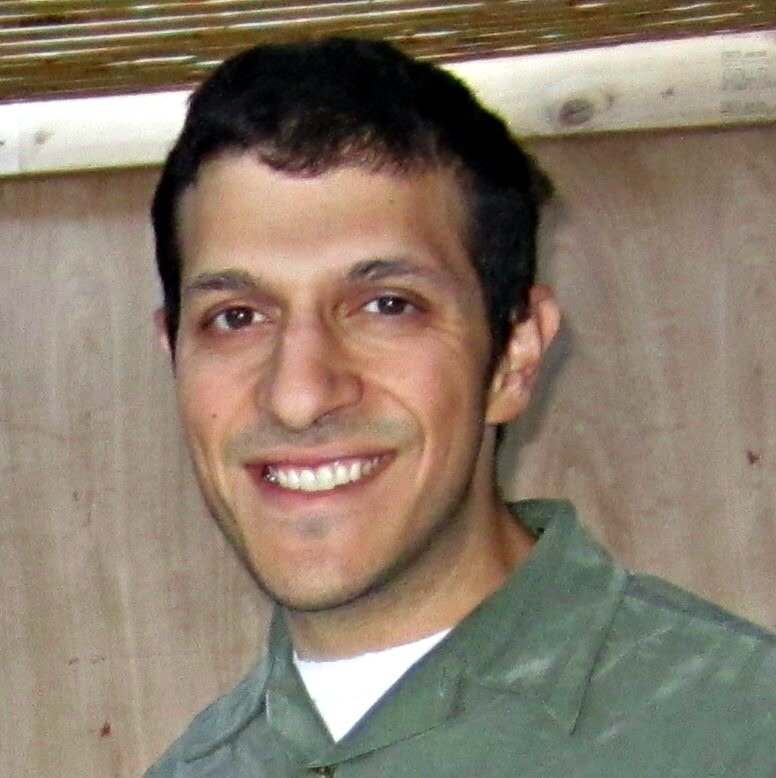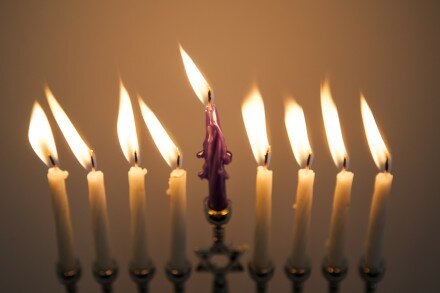By Molly Parr
Jonathan Mizrahi is a smart guy—like nuclear physicist smart. So it may not be a surprise that he was the one who figured out that this year’s magical confluence of Thanksgiving and Hanukkah is a very unique occurrence—as in, it won’t happen again for another 80 millennia! I asked him how, exactly, he figured this out, and what he’s planning to do to mark the occasion.
Explain to me how you know for certain that Thanksgiving and Hanukkah aren’t going to overlap like this for another 80,000 years or so. I’m pretty sure CJP hasn’t published its Jewish calendars that far out yet!
 The Jewish calendar is mathematical in nature; it’s not determined by a person. It is designed so that the months line up with the lunar cycle, while the years stay synced with the solar cycle. This guarantees that the holidays always fall in the appropriate season. Originally, the calendar was determined on a monthly basis by a court in Israel, but when Judaism became more decentralized, the calendar became fixed. It has been mathematically fixed for over a thousand years. The calendar’s synchronization with the solar year is not perfect. The calendar is drifting forward with respect to the solar cycle at a rate of four days every 1,000 years. Right now, the earliest that the first day of Hanukkah can fall is November 28. Coincidentally, this is also the latest that Thanksgiving can fall. This means that they can overlap, as they do this year. However, in another 150 years or so, the earliest Hanukkah will be able to fall will be November 29. They will therefore not be able to overlap again. If the calendar were never adjusted, it would slowly slip forward until it circled all the way around the solar year. But Jewish law requires the holidays to fall in their proper season, meaning that the calendar will have to be corrected at some point to prevent Passover from slipping into the summer.
The Jewish calendar is mathematical in nature; it’s not determined by a person. It is designed so that the months line up with the lunar cycle, while the years stay synced with the solar cycle. This guarantees that the holidays always fall in the appropriate season. Originally, the calendar was determined on a monthly basis by a court in Israel, but when Judaism became more decentralized, the calendar became fixed. It has been mathematically fixed for over a thousand years. The calendar’s synchronization with the solar year is not perfect. The calendar is drifting forward with respect to the solar cycle at a rate of four days every 1,000 years. Right now, the earliest that the first day of Hanukkah can fall is November 28. Coincidentally, this is also the latest that Thanksgiving can fall. This means that they can overlap, as they do this year. However, in another 150 years or so, the earliest Hanukkah will be able to fall will be November 29. They will therefore not be able to overlap again. If the calendar were never adjusted, it would slowly slip forward until it circled all the way around the solar year. But Jewish law requires the holidays to fall in their proper season, meaning that the calendar will have to be corrected at some point to prevent Passover from slipping into the summer.
What do you have planned to celebrate these two converging holidays? No pressure, but you’re not going to get another chance at turkey latkes for at least 60,000 years.
Ha! Well, personally, I plan to go to my parents’ house and spend the holiday with my family. Beyond that, I don’t have any specific plans.
We’re grandfathering you in as a Boston resident because you studied at Brandeis University, but you just moved to Albuquerque, N.M. What are you doing out there?
 I’m a physicist working at Sandia National Laboratories.
I’m a physicist working at Sandia National Laboratories.
If you had to choose, which is your favorite: Hanukkah or Thanksgiving?
Well, I think I’d have to go with Hanukkah. For one, it’s eight days long. It also has a lot more to it—the candles, songs, etc. That said, I have very fond associations with getting together with my family on Thanksgiving.
Four Questions is a weekly interview column featuring interesting people connected with the Greater Boston Jewish community. Find past columns here. Have an idea of someone we should interview?
















In 2006, Purim, Pi Day, and Inupiaq day all fell on the same date. When will that happen again?
[…] physicist Jonathan Mizrahi was the first to note that this Hanukkah and Thanksgiving convergence may truly be a one-time […]
Hypothesizing here. Hebrew year 5774 should have 1 added to account for time used because they had counted 0 as 1 on day one of first year, right? So 5775 is 5+7=12, 7+5=12, 12+12=24. 12 Old Testament tribes, 12 disciples of Jesus, 24 elders , etc. and 2018 makes Israel a nation for 70 years. Wish I had more scientific knowledge. I think comet ISON is wake up call now with the real story happening 12/25. Incidentally, numerologically speaking Chirstmas day on Lunar calendar starts on 24th. With the rate of speed ISON will be traveling plus our rotation and gravitational pull; it just may graze, impact, or disturb our axis, etc bringing wicked weather and ice melting and water levels raised. And for fun Luke 10:18 10 +18 =28 and says Jesus said to them: “I was watching Satan fall from heaven line lightening.” Equals 28 on the 28th when we have fire actually falling in the sky. Wow. There’s a whole lot more to this. Very interesting.
From a Catholic, thanks for the explanation. What body, scholarly group or other authority will decide when and how much adjustment will be made?
This is very similar to Easter which falls on a Sunday based on both lunar and solar considerations.
[…] in 1888 and will not return until the year 79,811 according to physicist and calendar expert Jonathan Mizrahi. Employing the help of Religious Scholars Tyler Roberts, Jonathan Z. Smith, and Sam Gill sheds […]